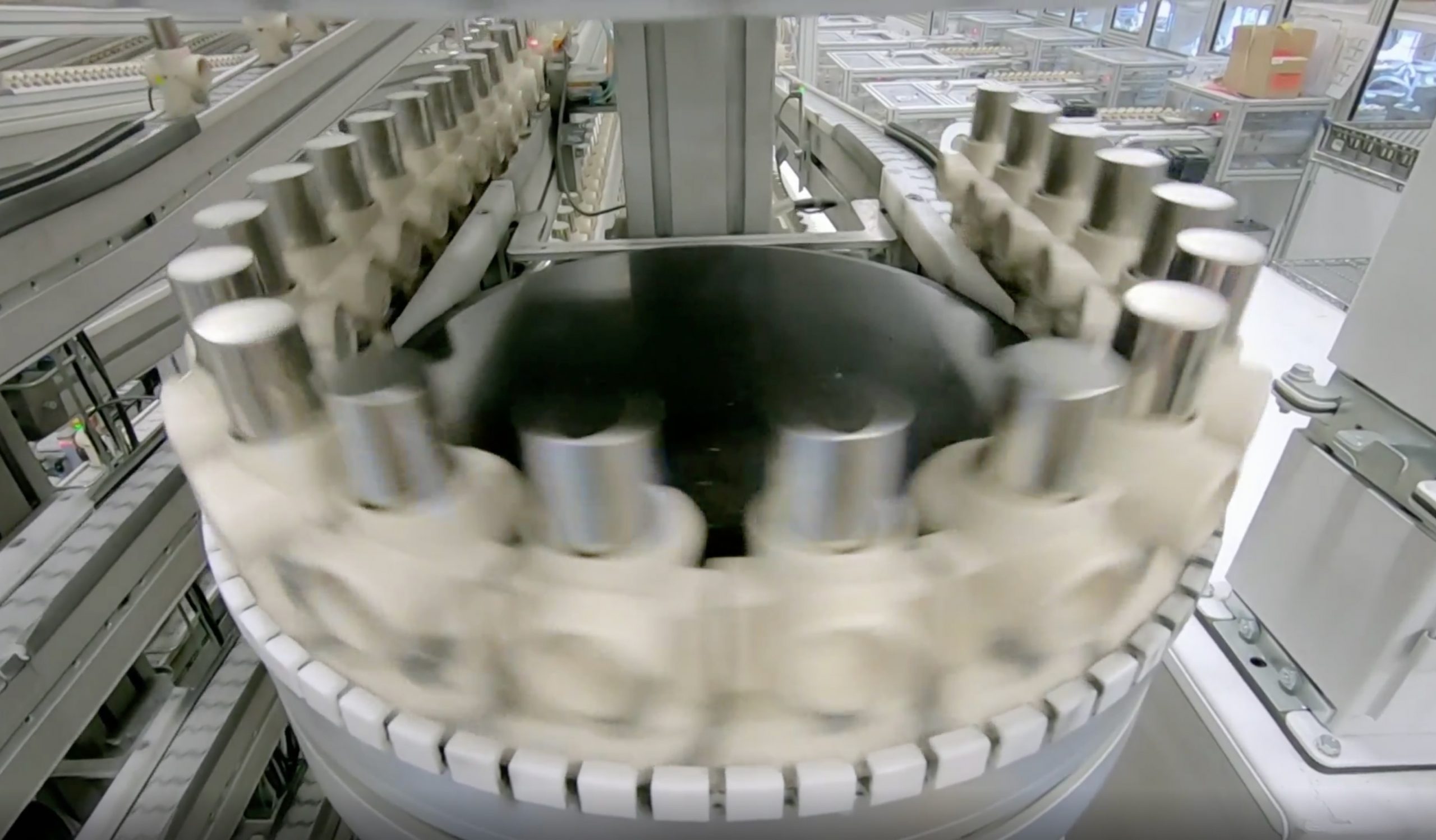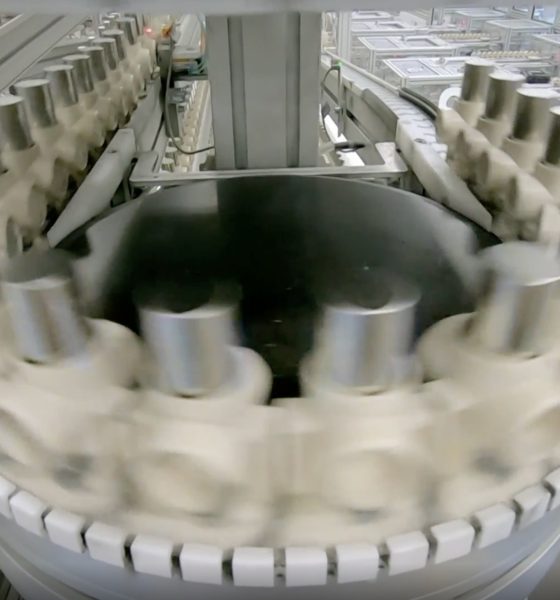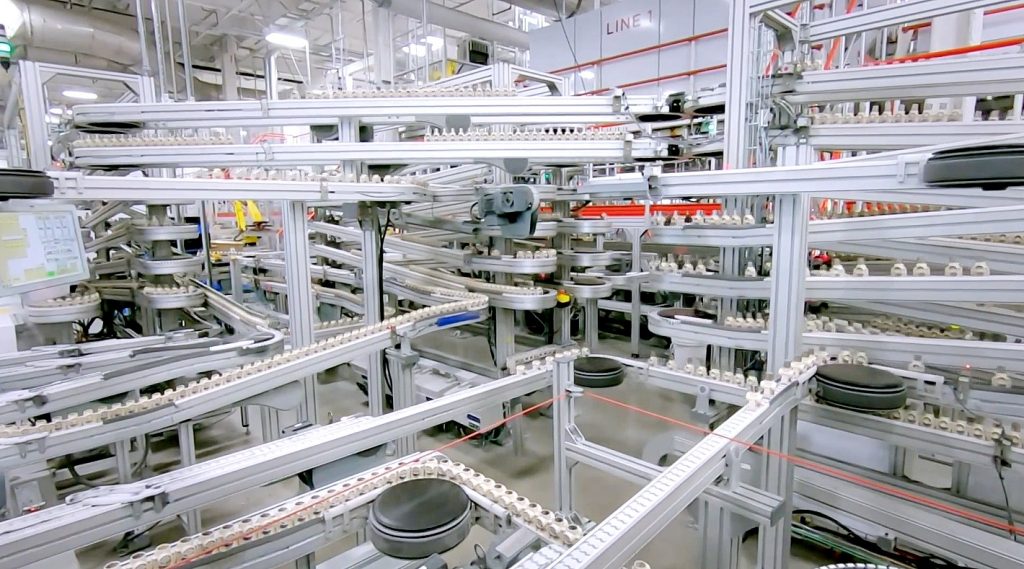

News
Tesla’s cobalt-free efforts are being closely watched by LG Chem, Samsung ahead of Battery Day
It appears that it is not only the electric vehicle community that is eagerly anticipating Tesla’s upcoming Battery Day event. Considering the company’s place in the EV movement, as well as its efforts in pursuing a cobalt-free solution for batteries, industry leaders like Samsung and LG Chem are reportedly watching Tesla and its battery announcements closely.
Battery Day has been mentioned by Elon Musk multiple times in the past, and last month, the company noted that the highly-anticipated event will be held on September 22. The CEO has informed analysts that Battery Day will include a “big reveal” of developments in Tesla’s battery efforts. The effects of such developments on the battery supply chain are also expected to be discussed.
Tesla has kept details of Battery Day secret, though industry officials have noted that details on new cobalt-free batteries will be revealed at the upcoming event. Tesla has been working on reducing its batteries’ cobalt content for years, as evidenced by a study from a German firm that determined that Model 3 batteries have 75% less cobalt than the cells used by companies like Volkswagen. In the second-quarter earnings call, Elon Musk noted that eventually, cobalt will be phased out completely.
EV battery makers such as LG Chem and Samsung have mostly favored nickel manganese cobalt (NMC) or nickel cobalt aluminum (NCA) batteries over cobalt-free lithium iron phosphate (LFP) chemistry due to their higher energy density, which allows vehicles to travel longer distances. LFP batteries are more environmentally-friendly and cost-effective, but they tend to be limited when it comes to range. This status quo seems poised to change with Battery Day, at least if speculations prove accurate.
Reports have emerged stating that CATL, one of Tesla’s battery partners in China, has begun supplying LPF batteries for the electric car maker’s locally-produced Model 3. Elon Musk emphasized this in the Q2 2020 earnings call, when he stated that Tesla will be boosting volume production in China of LFP battery packs for the Model 3. By the end of July, Panasonic, Tesla’s longtime battery partner, informed Reuters that it will be commercializing a cobalt-free battery in two to three years for the electric car maker.
Amidst these reports, industry leaders like LG Chem and Samsung are now facing what could very well be a crossroads with their battery strategy. If Tesla has come up with a way to solve the shortcomings of LFP batteries, there is a good chance that the battery industry could also start moving away from cobalt. Tesla, after all, is one of the world’s leading electric car maker, and its EV and energy storage business are both undergoing an aggressive expansion. Cobalt is also a controversial material to begin with, thanks to questionable mining practices in areas such as the Congo.

That being said, LG Chem has stated that it still believes that NMC chemistry will remain the mainstream in the global market due to its energy density advantages. “Though we are producing LFP batteries too, these have their shortcomings in energy density and weight. We believe NCM will remain the mainstream in the global EV battery market,” the company stated during its second-quarter conference call.
Samsung SDI was on the same page, stating that it will be focusing on NCA technology. Citing an industry official who requested anonymity, The Korea Times noted that Samsung is paying close attention to what Tesla will be announcing and unveiling on Battery Day.
“Many battery firms have tried to upgrade the energy density of LFP chemistry, but they have yet to have meaningful outcomes. Tesla is now saying it is increasing its reliance on LFP batteries and is anticipated to come up with information on new cobalt-free batteries during Battery Day. This can either mean that Tesla and CATL have come up with technology to improve the efficiency of LFP batteries or unprecedented technology in removing cobalt,” he said. “Since either way will likely affect the industrial trend, domestic companies are paying attention to what Tesla will reveal during the event,” the industry insider stated.
Tesla’s Battery Day event is expected to be held on September 22, 2020. A live audience is expected to be present, though the event will also be live-streamed.

News
Tesla ships out update that brings massive change to two big features
“This change only updates the name of certain features and text in your vehicle,” the company wrote in Release Notes for the update, “and does not change the way your features behave.”

Tesla has shipped out an update for its vehicles that was caused specifically by a California lawsuit that threatened the company’s ability to sell cars because of how it named its driver assistance suite.
Tesla shipped out Software Update 2026.2.9 starting last week; we received it already, and it only brings a few minor changes, mostly related to how things are referenced.
“This change only updates the name of certain features and text in your vehicle,” the company wrote in Release Notes for the update, “and does not change the way your features behave.”
The following changes came to Tesla vehicles in the update:
- Navigate on Autopilot has now been renamed to Navigate on Autosteer
- FSD Computer has been renamed to AI Computer
Tesla faced a 30-day sales suspension in California after the state’s Department of Motor Vehicles stated the company had to come into compliance regarding the marketing of its automated driving features.
The agency confirmed on February 18 that it had taken a “corrective action” to resolve the issue. That corrective action was renaming certain parts of its ADAS.
Tesla discontinued its standalone Autopilot offering in January and ramped up the marketing of Full Self-Driving Supervised. Tesla had said on X that the issue with naming “was a ‘consumer protection’ order about the use of the term ‘Autopilot’ in a case where not one single customer came forward to say there’s a problem.”
This was a “consumer protection” order about the use of the term “Autopilot” in a case where not one single customer came forward to say there’s a problem.
Sales in California will continue uninterrupted.
— Tesla North America (@tesla_na) December 17, 2025
It is now compliant with the wishes of the California DMV, and we’re all dealing with it now.
This was the first primary dispute over the terminology of Full Self-Driving, but it has undergone some scrutiny at the federal level, as some government officials have claimed the suite has “deceptive” names. Previous Transportation Secretary Pete Buttigieg was one of those federal-level employees who had an issue with the names “Autopilot” and “Full Self-Driving.”
Tesla sued the California DMV over the ruling last week.
News
Tesla workers push back against Giga Berlin unionization
“IG Metall did not succeed in Giga Berlin‘s works council election earlier today. The union share was reduced from nearly 40% in 2024 to 31% in 2026! This is a clear message by the Giga Berlin team towards an independent co-determination! The list called Giga United, led by the current chairwoman, Michaela Schmitz, received the most votes with more than 40%! Good news for Giga Berlin!”

Tesla workers pushed back against unionization efforts at Gigafactory Berlin, and over the past few years, there has been a dramatic decrease in interest to unionize at the German plant.
Gigafactory Berlin Plant Manager André Thierig announced on Wednesday that IG Metall, the European union group, saw its share reduce from 40 to 31 percent in 2026 as employees eligible to vote on the issue. Instead, the Giga Berlin team, known as Giga United, received the most votes with more than 40 percent.
BREAKING! 🚨
IG Metall did not succeed in Giga Berlin‘s works council election earlier today. The union share was reduced from nearly 40% in 2024 to 31% in 2026!
This is a clear message by theGiga Berlin team towards an independent co-determination!
The list called Giga…
— André Thierig (@AndrThie) March 4, 2026
Thierig gave specific details in a post on X:
“IG Metall did not succeed in Giga Berlin‘s works council election earlier today. The union share was reduced from nearly 40% in 2024 to 31% in 2026! This is a clear message by the Giga Berlin team towards an independent co-determination! The list called Giga United, led by the current chairwoman, Michaela Schmitz, received the most votes with more than 40%! Good news for Giga Berlin!”
There were over 10,700 total employees who were eligible to vote, with 87 percent of them turning out to cast what they wanted. There were three key outcomes: Giga United, IG Metall, and other notable groups, with the most popular being the Polish Initiative.
The 37-seat council remains dominated by non-unionized representatives, preserving Giga Berlin as Germany’s only major auto plant without a collective bargaining agreement.
Thierig and Tesla framed the outcome as employee support for an “independent, flexible, and unbureaucratic” future, enabling acceleration on projects like potential expansions or new models. IG Metall expressed disappointment, accusing management of intimidation tactics and an “unfair” campaign.
The first election of this nature happened back in 2022. In 2024, IG Metall emerged as the largest single faction with 39.4 percent, but non-union lists coalesced for a majority.
But this year was different. There was some extra tension at Giga Berlin this year, as just two weeks ago, an IG Metall rep was accused by Tesla of secretly recording a council meeting. The group countersued for defamation.
Tesla Giga Berlin plant manager faces defamation probe after IG Metall union complaint
This result from the 2026 vote reinforced Tesla’s model of direct employee-management alignment over traditional German union structures, amid ongoing debates about working conditions. IG Metall views it as a setback but continues advocacy. Tesla sees it as validation of its approach in a competitive EV market.
This outcome may influence future labor dynamics at Giga Berlin, including any revival of expansion plans or product lines, which Musk has talked about recently.
News
SpaceX President Gwynne Shotwell details xAI power pledge at White House event
The commitment was announced during an event with United States President Donald Trump.

SpaceX President Gwynne Shotwell stated that xAI will develop 1.2 gigawatts of power at its Memphis-area AI supercomputer site as part of the White House’s new “Ratepayer Protection Pledge.”
The commitment was announced during an event with United States President Donald Trump.
During the White House event, Shotwell stated that xAI’s AI data center near Memphis would include a major energy installation designed to support the facility’s power needs.
“As you know, xAI builds huge supercomputers and data centers and we build them fast. Currently, we’re building one on the Tennessee-Mississippi state line. As part of today’s commitment, we will take extensive additional steps to continue to reduce the costs of electricity for our neighbors…
“xAI will therefore commit to develop 1.2 GW of power as our supercomputer’s primary power source. That will be for every additional data center as well. We will expand what is already the largest global Megapack power installation in the world,” Shotwell said.
She added that the system would provide significant backup power capacity.
“The installation will provide enough backup power to power the city of Memphis, and more than sufficient energy to power the town of Southaven, Mississippi where the data center resides. We will build new substations and invest in electrical infrastructure to provide stability to the area’s grid.”
Shotwell also noted that xAI will be supporting the area’s water supply as well.
“We haven’t talked about it yet, but this is actually quite important. We will build state-of-the-art water recycling plants that will protect approximately 4.7 billion gallons of water from the Memphis aquifer each year. And we will employ thousands of American workers from around the city of Memphis on both sides of the TN-MS border,” she noted.
The Ratepayer Protection Pledge was introduced as part of the federal government’s effort to address concerns about rising electricity costs tied to large AI data centers, as noted in an Insider report. Under the agreement, companies developing major AI infrastructure projects committed to covering their own power generation needs and avoiding additional costs for local ratepayers.








